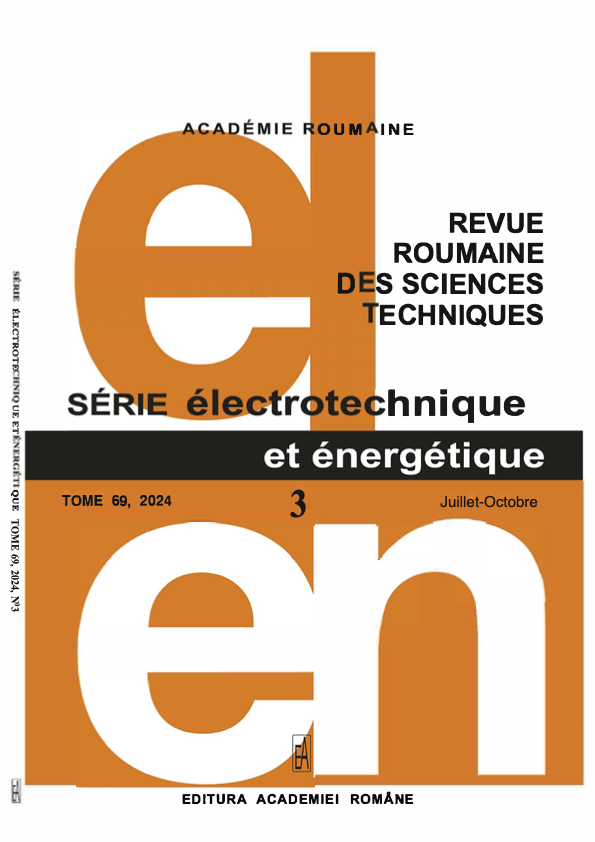BUFIT: FINE-GRAINED DYNAMIC BURST FAULT INJECTION TOOL FOR EMBEDDED field programmable gate array TESTING
DOI:
https://doi.org/10.59277/RRST-EE.2024.69.3.8Keywords:
Field programmable gate arrays (FPGAs), Adaptive fault injection (AFI) tool, Linear Feedback Shift Register, Multiple bit upsetsAbstract
Fault injection (FI) is a well-known method to attack embedded systems, particularly advanced FPGAs and microcontrollers physically. The FPGA-based embedded system constitutes SRAM for configuration data storage. Multiple-bit upset is a main threat for FPGAs due to technology scaling and complex application bit files. Space environments additionally incur radiation threats to these devices. This paper proposes burst error modeling and a burst fault injection tool (BUFIT) to address these issues. BUFIT has been proposed with fine-grained and coarse-grained circuits. Built-in instrumented FPGA-based FI is proposed for effectively injecting MBUs in configuration memory with space adaptive rate for accurately estimating soft errors. Evaluation of proposed BUFIT on Kintex-7 target FPGA to various OR 1200-based workloads is given to analyze the speed up of the proposed technique. Results on the OR 1200 processor show that BUFIT is three and two orders of magnitude faster than existing DPR and SCFIT techniques. It uses only 0.4 % CLB overhead and has negligible impact on FFs of target SFPGAs.
References
(1) A. Gangolli, Q.H. Mahmoud, A. Azim, A systematic review of fault injection attacks on IOT systems. Electron., 11, 13, p. 2023 (2022).
(2) Z. Gao, X. Liu, An overview on fault diagnosis, prognosis and resilient control for wind turbine systems, Processes, 9, 2, p. 300 (2021).
(3) M. Carminati, G. Scandurra, Impact and trends in embedding field programmable gate arrays and microcontrollers in scientific instrumentation, Rev. Sci. Instrum., 92, 9, p. 091501 (2021).
(4) A. Appathurai, P. Deepa, Design for reliability: A novel counter matrix code for FPGA based quality applications, 6th Asia Symposium on Quality Electronic Design (ASQED), pp. 56–61 (2015).
(5) L.A. Aranda, A. Sánchez-Macián, J.A. Maestro, ACME: A tool to improve configuration memory fault injection in SRAM-based FPGAs, IEEE Access, 7, pp.128153–128161 (2019).
(6) S. Medjmadj, D. Diallo, A. Arias, Mechanical sensor fault-tolerant controller in PMSM drive: experimental evaluation of observers and signal injection for position estimation. Rev. Roum. Sci. Techn. – Électrotechn. Et Énerg., 66, 2, pp.77–83 (2021).
(7) A. Ahilan, P. Deepa, Modified decimal matrix codes in FPGA configuration memory for multiple bit upsets, International Conference on Computer Communication and Informatics, 10 (2015).
(8) T. Given-Wilson, N. Jafri, A. Legay, Combined software and hardware fault injection vulnerability detection. Innovations Syst. Software Eng., 16, pp. 101–120 (2020).
(9) S. Mandal, S. Sarkar, W.M. Ming, A. Chattopadhyay, A. Chakrabarti, Criticality aware soft error mitigation in the configuration memory of SRAM based FPGA, 32nd International Conference on VLSI Design and 18th International Conference on Embedded Systems (VLSID), pp. 257–262 (2019).
(10) A. Ramos, R.G. Toral, P. Reviriego, J.A. Maestro, An ALU protection methodology for soft processors on SRAM-based FPGAs, IEEE Trans. Comput., 68, 9, pp.1404–1410 (2019).
(11) R.V.W. Putra, M.A. Hanif, M. Shafique, Respawn: energy-efficient fault-tolerance for spiking neural networks considering unreliable memories. In 2021 IEEE/ACM International Conference on Computer-Aided Design (ICCAD), pp. 1–9 (2021).
(12) I. Bentchikou, K. Halbaoui, F. Boudjema, D. Boukhetala, T. Abdelhalim, Alternative hybrid control of switched systems. An application to machine DC fed by multicellular converter, Rev. Roum. Sci. Techn. – Électrotechn. Et Énerg., 67, 3, pp. 247–252 (2022).
(13) H. Metawie, M. Safar, M.W. El-Kharashi, An evaluation method for embedded software dependability using QEMU-based fault injection framework, 6th International Conference on System Reliability and Safety (ICSRS), pp. 548–555 (2022).
(14) L. Lanzieri, G. Martino, G. Fey, H. Schlarb, T.C. Schmidt, M. Wählisch, A Review of Techniques for Ageing Detection and Monitoring on Embedded Systems. arXiv preprint arXiv:2301.06804 (2023).
(15) L. Claudepierre, P.Y. Péneau, D. Hardy, E. Rohou, TRAITOR: a low-cost evaluation platform for multifault injection. In Proceedings of the 2021 International Symposium on Advanced Security on Software and Systems, pp. 51–56 (2021).
(16) J. Richter-Brockmann, P. Sasdrich, T. Guneysu, Revisiting fault adversary models-hardware faults in theory and practice, IEEE Trans. Comput. (2022).
(17) H. Liao, C. Gebotys, Methodology for em fault injection: Charge-based fault model, Design, Automation & Test in Europe Conference & Exhibition (DATE), pp. 256–259 (2019).
(18) J. Breier, M. Khairallah, X. Hou, Y. Liu, A countermeasure against statistical ineffective fault analysis, IEEE Transactions on Circuits and Systems II: Express Briefs, 67, 12, pp. 3322–3326 (2020).
(19) F. Cerveira, I. Kocsis, R. Barbosa, H. Madeira, A. Pataricza, Exploratory data analysis of fault injection campaigns, IEEE International Conference on Software Quality, Reliability and Security (QRS), pp. 191–202 (2018).
(20) A. Chatzidimitriou, G. Papadimitriou, C. Gavanas, G. Katsoridas, D. Gizopoulos, Multi-bit upsets vulnerability analysis of modern microprocessors, IEEE International Symposium on Workload Characterization (IISWC), pp. 119–130 (2019).
(21) B.M. Kumar, J. Ragaventhiran, V. Neela, Hybrid optimization integrated intrusion detection system in WSN using ELMAN network, International Journal of Data Science and Artificial Intelligence, 02, 02, pp. 55–62 (2024).
(22) M. Anisha, V.A. Beenu, Double secure cloud medical data using Euclidean distance-based Okamoto Uchiyama homomorphic encryption, International Journal of System Design and Computing, 02, 01, pp. 1–7 (2024).
Downloads
Published
Issue
Section
License
Copyright (c) 2024 REVUE ROUMAINE DES SCIENCES TECHNIQUES — SÉRIE ÉLECTROTECHNIQUE ET ÉNERGÉTIQUE

This work is licensed under a Creative Commons Attribution-NonCommercial-NoDerivatives 4.0 International License.


